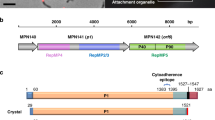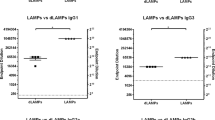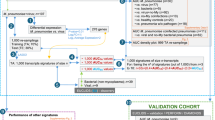Abstract
MYCOPLASMA PNEUMONIAE (MP) is an important causative agent of lower respiratory tract illness in man1. Lymphocytes from subjects who have experienced MP infection show a high degree of stimulation when cultured in the presence of MP antigen2,3. But high concentrations of MP antigen also stimulate, to some extent, lymphocytes from individuals without serological evidence of previous MP infection, suggesting that these subjects have either been infected with MP in the past or that MP also has a non-antigen-specific, mitogenic effect2. Several mitogens are known : the plant lectins phytohaemagglutinin (PHA) and concanavalin A, for example, have a mitogenic effect on T lymphocytes4, and certain bacterial products, such as lipopolysaccharide (LPS) of E. coli4 and a purified protein derivative of tuberculin (PPD) are mitogenic for mouse B cells5 and induce polyclonal antibody synthesis in mouse spleen cells4. These substances are called polyclonal B-cell activators (PBA) (ref. 6). We now report that MP is mitogenic for mouse and guinea pig lymphocytes and induces polyclonal antibody formation in mouse spleen cells.
This is a preview of subscription content, access via your institution
Access options
Subscribe to this journal
Receive 51 print issues and online access
$199.00 per year
only $3.90 per issue
Buy this article
- Purchase on SpringerLink
- Instant access to full article PDF
Prices may be subject to local taxes which are calculated during checkout
Similar content being viewed by others
References
Hayflick, L., and Chanock, R. M., Bact. Rev., 29, 185 (1965).
Biberfeld, G., Biberfeld, P., and Sterner, G., Clin. exp. Immun., 17, 29 (1974).
Fernald, G. W., Infect. Immun., 5, 552 (1972).
Möller, G., (ed.), Transplant. Rev., 11 (1972).
Sultzer, B. M., and Nilsson, B., Nature new Biol., 240, 198 (1972).
Coutinho, A., and Möller, G., Adv. Immun., 21, 113 (1975).
Coutinho, A., Möller, G., and Richter, W., Scand. J. Immun., 3, 321 (1974).
Howard, J. G., Vicari, G., and Courtenay, B. M., Immunology, 29, 585 (1975).
Brunner, H., James, W. D., Horswood, R. L., and Chanock, R. M., J. infect. Dis., 127, 315 (1973).
Ginsburg, H., and Nicolet, J., Nature new Biol., 246, 143 (1973).
Razin, S., Kahane, I., and Kovartovsky, J., in Pathogenic Mycoplasmas, Ciba Found.Sym., 93 (North-Holland, Amsterdam, 1972).
Plackett, P., Marmion, B. P., Shaw, E. J., and Lemcke, R. M., Aust. J. exp. Biol. med. Sci., 47, 171 (1969).
Beckman, B. L., and Kenny, G. E., J. Bact., 96, 1171 (1968).
Biberfeld, G., Acta. path. microbiol. Scand., B79, 620 (1974).
Biberfeld, G.,thesis, Univ. Stockholm (1971).
Coutinho, A., Transplant. Rev., 23, 49 (1975).
Author information
Authors and Affiliations
Rights and permissions
About this article
Cite this article
BIBERFELD, G., GRONOWICZ, E. Mycoplasma pneumoniae is a polyclonal B-cell activator. Nature 261, 238–239 (1976). https://doi.org/10.1038/261238a0
Received:
Accepted:
Issue date:
DOI: https://doi.org/10.1038/261238a0
This article is cited by
-
Diagnostic performance of four SARS-CoV-2 antibody assays in patients with COVID-19 or with bacterial and non-SARS-CoV-2 viral respiratory infections
European Journal of Clinical Microbiology & Infectious Diseases (2021)
-
Antibodies to actin in autoimmune haemolytic anaemia
BMC Veterinary Research (2010)
-
Binding of thyrotropin to selected mycoplasma species: detection of serum antibodies against a specific mycoplasma membrane antigen in patients with autoimmune thyroid disease
Journal of Endocrinological Investigation (1989)
-
Polyclonal activation and experimental nephropathies
Kidney International (1988)
-
Cytogenetic effects of mycoplasmal infection of cell cultures: A review
In Vitro (1984)



